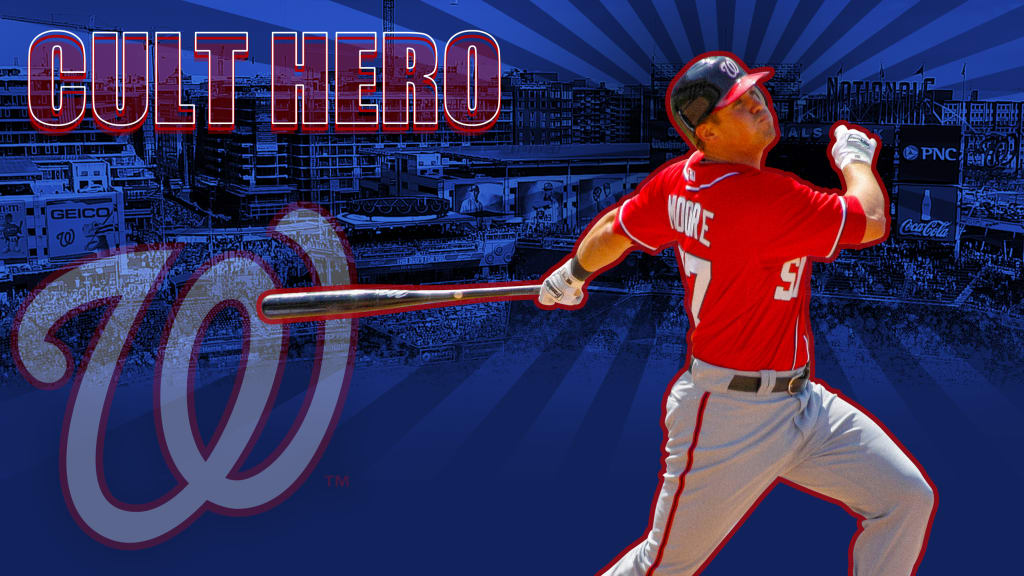
WASHINGTON -- The Nationals have had plenty of top prospects come up through their system and garner tons of attention. From top overall Draft picks like Bryce Harper and Stephen Strasburg to highly touted rookies like Anthony Rendon and Juan Soto, fans tracked these future stars before they arrived at Nationals Park.
Tyler Moore was never a top prospect. A 16th-round selection in the 2008 MLB Draft, Moore fought his way to make it to the big leagues, eventually being in position to come through with one of the biggest hits in Nationals history -- a go-ahead RBI knock in the first postseason game in Nats history in 2012.
That made Moore something of a cult hero to Nationals fans.
“D.C. fans are extremely loyal,” Moore said during a phone interview. “I always loved playing there, after being drafted there. They were just excited because we were in the playoffs. We won that first game ... coming back, it was just a different feel and atmosphere. The fans are really behind you.”
More than six years after Moore came through with the first clutch hit in Nats postseason history, he still easily recalled fond memories of his time in Washington.
Moore is out of baseball now and hasn’t played since the 2017 season. He still keeps in touch with more than a few of his old Nats teammates, however, while spending his time near Madison, Miss. When he was not busy running his own business, or raising his newborn child, he was glued to the television during the Nationals’ run to the 2019 World Series championship.
“After getting over that first initial playoff series, once they got past that, it was kind of like it freed them up a good bit,” Moore said. “And it just seemed like every at-bat, every guy in that lineup was always fighting for a good at-bat, they just took it to them.”
Looking back on it, Moore believes the 2012 Nationals had that sort of capability, even if they did not realize it at the time. Washington had arrived ahead of schedule, exceeding preseason expectations to reach the postseason for the first time in team history. The Nats then lost in the National League Division Series, a heartbreaking five-game defeat to the Cardinals. In retrospect, that series and debut season would be the height of Moore’s big league career.
After scuffling in his first professional season, Moore swatted his way through the Minors for the next three-plus years. He rose through the ranks as a power hitter, hammering 31 home runs in 2010 at Class A Advanced Potomac and matched that home run total the next season with Double-A Harrisburg. By the time he reached Triple-A Syracuse in ’12, he appeared big league ready, recording a slash line of .307/.374/.653 with nine homers in 29 games. That earned Moore a promotion to the Majors.
Moore played in 75 games as a rookie in D.C. and continued to prove he belonged with an .840 OPS and 10 homers in 171 plate appearances, becoming an integral part of the Nats’ postseason bench. In Game 1 of the NLDS, with the Nationals trailing in the eighth inning, manager Davey Johnson sent Moore to the plate instead of Chad Tracy, who, with 12 pinch-hits, had been their most productive bench player. Johnson wanted to play the matchups against Cardinals lefty reliever Marc Rzepczynski, and Moore remembers thinking along with his manager as he prepared for the huge at-bat.
With a 2-1 count, Moore swung at a sinker down and off the plate away and dropped it perfectly into right field for a go-ahead two-run single.
“I just remember how fired up the guys were,” Moore recalled. “It was just an awesome moment to win that first game. We just felt like we were ahead of the curb.”
Unfortunately, that marked the pinnacle of Moore’s career. He never duplicated the success he had during his rookie season, and even after the team cut ties with him in 2015, there was a portion of the fanbase that held out hope he would recapture the magic of his debut year.
Whether it was the bond from the 2012 season or the way he worked his way to the Majors after being an unheralded Draft pick, or just the infectious smile and joy he always showed on the field, Nationals fans felt a connection to Moore. That’s why he continues to be remembered as part of the team’s history.
“D.C. was always the first organization, kind of the first love I have with an organization,” Moore said. “The fans just always embraced not just me, but everyone that was kind of raised up in that organization. It was a really cool thing to see.”